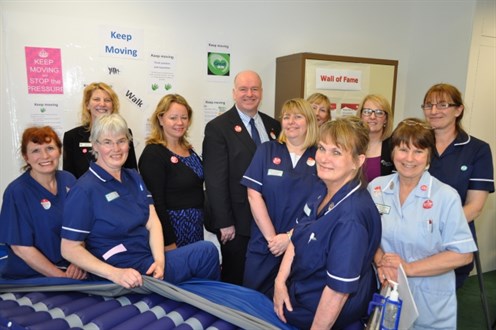Nurses Day (12 May) was used by a group of healthcare professionals to raise awareness about the ‘Stop the Pressure’ campaign.
The Department’s Interim Deputy Director of Nursing, Cathie Quine, has been leading this campaign together with the Island’s Wound Action Group, which includes nursing representation from across the Island.
‘Stop the Pressure’ is a UK-wide campaign run by the NHS, aiming to help prevent pressure ulcers. These are injuries that break down the skin and underlying tissue and are caused when an area of skin is placed under pressure. They are sometimes known as ‘bedsores’ or ‘pressure sores’.
Pressure ulcers can range in severity from patches of discoloured skin to open wounds that expose the underlying bone or muscle.
Pressure ulcers are mostly preventable and the Island’s healthcare staff across the public, private and third sectors are striving to reduce the number of cases.
In launching the campaign, Minister for Health and Social Care, Howard Quayle MHK, said:
'The prevalence of pressure ulcers is a key indicator of the quality of nursing care. We are fortunate in the Isle of Man to have a proactive workforce which strives to reduce the numbers of these painful and sometimes life threatening injuries'.
'The Department has access to some of the most up to date equipment such as dynamic mattresses and skin dehumidifiers, however we need to do all we can to raise awareness amongst a broad range of health and social care professionals to help prevent pressure ulcers or, where this isn’t possible, to intervene as quickly as possible with appropriate treatment.'
To engage the workforce, staff have been asked to take part in a competition to design ‘Stop the Pressure’ information boards to be displayed in wards and health care settings across the Island.
In the UK it is estimated that nearly 700,000 people are affected by pressure ulcers each year across all care settings, including patients in their own homes; this is equivalent to a prevalence of 8%. Locally the prevalence across acute care and primary care last year was just over 2%.
Pam Fulton, Tissue Viability Specialist Nurse, said:
'Pressure ulcers have a detrimental effect on patient health and wellbeing as well as a significant financial impact on our health service. While it is difficult to equate the cost of a pressure ulcer in monetary terms, in human terms the cost of the discomfort and the impact that has on quality of life is immense. Ninety-five percent of pressure ulcers are preventable, so we are very keen to raise awareness amongst staff on what they can do to prevent these from occurring.'


